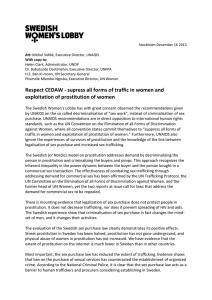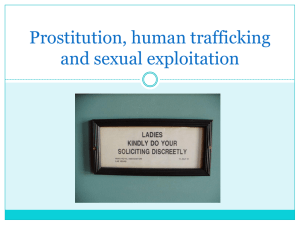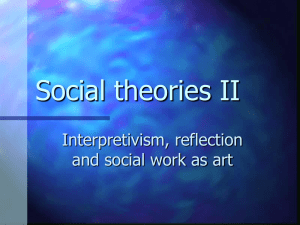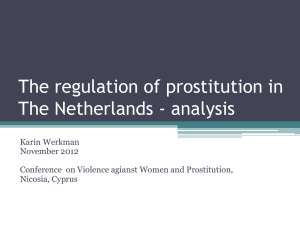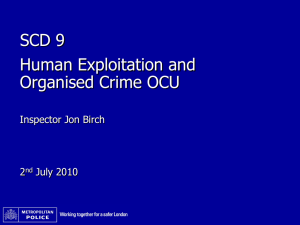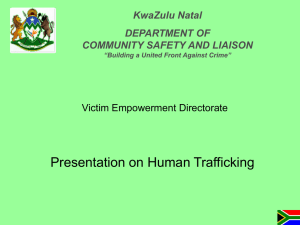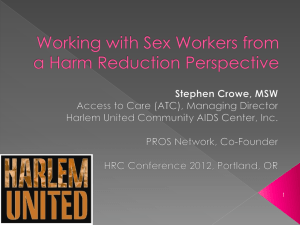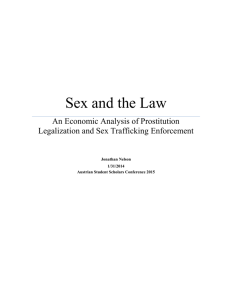INST 4240 Global Sex Work and Trafficking
advertisement
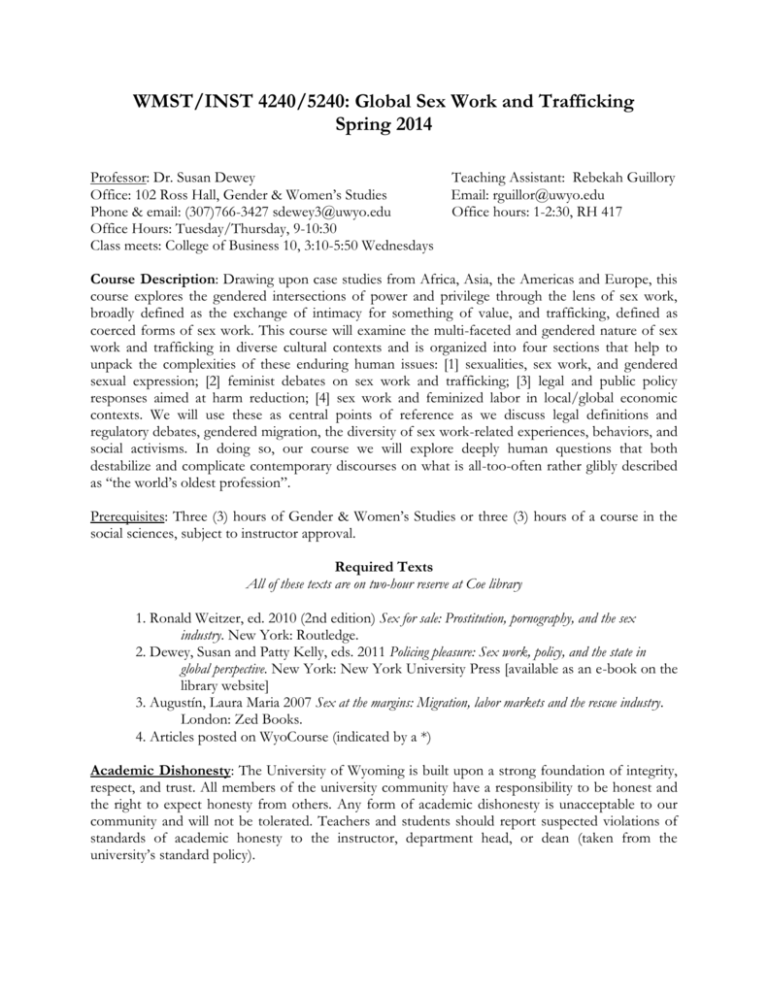
WMST/INST 4240/5240: Global Sex Work and Trafficking Spring 2014 Professor: Dr. Susan Dewey Office: 102 Ross Hall, Gender & Women’s Studies Phone & email: (307)766-3427 sdewey3@uwyo.edu Office Hours: Tuesday/Thursday, 9-10:30 Class meets: College of Business 10, 3:10-5:50 Wednesdays Teaching Assistant: Rebekah Guillory Email: rguillor@uwyo.edu Office hours: 1-2:30, RH 417 Course Description: Drawing upon case studies from Africa, Asia, the Americas and Europe, this course explores the gendered intersections of power and privilege through the lens of sex work, broadly defined as the exchange of intimacy for something of value, and trafficking, defined as coerced forms of sex work. This course will examine the multi-faceted and gendered nature of sex work and trafficking in diverse cultural contexts and is organized into four sections that help to unpack the complexities of these enduring human issues: [1] sexualities, sex work, and gendered sexual expression; [2] feminist debates on sex work and trafficking; [3] legal and public policy responses aimed at harm reduction; [4] sex work and feminized labor in local/global economic contexts. We will use these as central points of reference as we discuss legal definitions and regulatory debates, gendered migration, the diversity of sex work-related experiences, behaviors, and social activisms. In doing so, our course we will explore deeply human questions that both destabilize and complicate contemporary discourses on what is all-too-often rather glibly described as “the world’s oldest profession”. Prerequisites: Three (3) hours of Gender & Women’s Studies or three (3) hours of a course in the social sciences, subject to instructor approval. Required Texts All of these texts are on two-hour reserve at Coe library 1. Ronald Weitzer, ed. 2010 (2nd edition) Sex for sale: Prostitution, pornography, and the sex industry. New York: Routledge. 2. Dewey, Susan and Patty Kelly, eds. 2011 Policing pleasure: Sex work, policy, and the state in global perspective. New York: New York University Press [available as an e-book on the library website] 3. Augustín, Laura Maria 2007 Sex at the margins: Migration, labor markets and the rescue industry. London: Zed Books. 4. Articles posted on WyoCourse (indicated by a *) Academic Dishonesty: The University of Wyoming is built upon a strong foundation of integrity, respect, and trust. All members of the university community have a responsibility to be honest and the right to expect honesty from others. Any form of academic dishonesty is unacceptable to our community and will not be tolerated. Teachers and students should report suspected violations of standards of academic honesty to the instructor, department head, or dean (taken from the university’s standard policy). Disability Statement: If you have a physical, learning, or psychological disability and require accommodations, please let me know as soon as possible. You must register with, and provide documentation of your disability to University Disability Support Services (UDSS) in SEO, Room 330 Knight Hall, 766-6189, TTY 766-3073. Global Awareness (G): This course fulfills the Global Awareness (G) requirement of the 2003 University Studies Program. Global Awareness (G) courses strive to broaden our perspectives through the exploration of viewpoints from other societies, cultures, religions, or geopolitical regions. With an eye on both historical and contemporary experience, G courses are designed to challenge our assumptions about the ways of the world and to help us understand and embrace global cultural diversity. Course Requirements and Grading: Here are the criteria that I will use to assess your final grade in this course (more detailed descriptions of each are provided in the pages that follow): 30% Two short reflection papers (4-5 pages, double spaced), due in class 2/25 and 3/11 10% Presentations based on thoughtful, engaged small group discussion 20% Annotated bibliography, due 4/1 20% Exam, 4/15 20% Final project, due in class 5/6 A= 90-100 B= 80-89 C= 70-79 D= 60-69 F= Below 60 Grading Scale A note on attendance: Our class meets only once a week, which means that your attendance at every session is critical. Missing one of our classes is akin to missing a week of ordinary classes, and so I will reduce your final grade by five points for every class missed unless you can provide documentation of an emergency or similarly unavoidable circumstance. Reflection Paper Guidelines Worth a significant percentage (30%) of your final grade, the two reflection papers present an excellent opportunity for you to demonstrate your ability to apply original critical thinking skills to each of the complex, nuanced sections that organize our course. I hope that you will think of each of these papers as an opportunity to monitor your progress in the course. Each paper will be due the week after we complete each respective section, and should be, at a minimum, four to five double-spaced pages in length. It should make use of at least two assigned sources and one nonassigned peer reviewed source in order to substantiate your argument. If you are having difficulty thinking of topics to write about, please contact me via email or speak to me in person. Here are some examples of appropriate reflection paper topics. Although there is substantial room for flexibility in choosing your topic, please remember that your choice should be limited enough in scope to fully discuss in short paper format. Many of the examples below have a very specific thesis combined with a case study, a format that I strongly recommend because it will make your task of research, analysis, and writing much easier. Section One: Sexualities, sex work, and gendered sexual expression Sample thesis: "This paper will discuss arguments for and against the legalization of prostitution, with a particular focus on the organizations involved in these debates in the U.S." Section Two: Feminist debates on sex work and trafficking Sample thesis: "My paper will discuss abolitionism as a human rights movement, arguing that its proponents seek to empower all women by attempting to eradicate all forms of sex work." Grading rubric for reflection papers: Each of your reflection papers is worth a maximum of 15 points of your final grade's 100 point scale, assessed using the following point scale: 6 points: Clarity of your thesis, which refers to the ease with which readers can understand the point you would like to make in your paper. 6 points: Effective use of at least two assigned readings from the appropriate course section to substantiate your thesis. By this I mean that it should be obvious to the reader that you've read, understood, and critically analyzed the two assigned readings. 2 points: Effective use of at least one non-assigned, peer-reviewed scholarly article to substantiate your thesis. I will evaluate this in the same way that I assess your use of assigned readings. 1 point: Creativity, polish, and style, meaning that it is evident to the reader that you have spent time crafting your argument, writing your paper in an analytical fashion, and have proofread it at least once prior to submitting it. Grading rubric for presentations based on thoughtful, engaged group discussion: I suggest that we begin class with approximately half an hour of group discussion facilitated by me, as usual, and then divide into four groups for small group discussion, with 7 people per group. This will allow the four students in leadership roles because of their graduate student status or participation in a teaching practicum (Rebekah, Josh, Hollie, and Ola) and myself to help moderate the small group discussion. Each group will focus on a particular reading assigned for that day, with the goal of highlighting particular themes, issues, and connections to the content of our class. Two people from each group can present each class, for a total of 8 people per class, which will give everyone at least two opportunities to present. I will drop the lowest score for those who present more than twice, but this can only happen after everyone has presented twice. That means that I can give you a maximum of five total points for each time that you present the contents of group work. Here are the criteria that I will use to calculate the five points each time you present: 1. Has the presenter demonstrated thorough and thoughtful engagement with the reading assigned to the group? 2. Does the presenter clearly articulate the major insights obtained through small group work in a way that does not simply summarize the content of the readings, but rather provides a new way of thinking about them? 3. Can the presenter link key points, theories, and conceptual frameworks in the article to broader themes discussed in our class? Annotated Bibliography Guidelines Worth 20% of your final grade, this assignment will prepare you to critically analyze (and mobilize findings from) at least ten peer-reviewed readings in order to answer the research question posed in the final project. Creating an annotated bibliography involves carefully reading each source and summarizing your findings, in your own words, in abstract-length format following the full citation of the source. At a minimum, your annotated bibliography should summarize the source’s scope and findings, including the author’s (or authors’) disciplinary background and clearly explain how you will employ findings presented in the source to answer your final project’s central research question You can find an excellent source for more information on annotated bibliographies at: http://owl.english.purdue.edu/owl/resource/614/01/ Final Project Comprising at least 15 (double-spaced) pages of original written work, the final project is the culmination of your semester-long engagement with a research question related to sexuality, sex work, or trafficking. You should consult with me at least twice regarding your final project topic, and these consultations will ideally take place at the beginning of the semester (when you decide upon a topic) and in the middle of the semester (when your project is midway toward completion). At a minimum, the final project will comprise four criteria in a polished form: [1] original analysis of an issue related to sexuality, sex work, or trafficking; [2] a clear description of your research questions; [3] an academic/scholarly literature review; [4] a significance section documenting what you think your research adds to this academic literature and general human knowledge on your topic of choice. Graduate students will earn their grade by completing all requirements for 4240 as well as an additional 20% of coursework. Graduate students will read The State of Sex: Tourism, Sex, and Sin in the New American Heartland by Barbara Brents, Crystal Jackson and Kathryn Hausbeck (2010, Routledge), work to help facilitate class discussion as outlined in the section on presentations, and plan a class presentation scheduled for May 6 based upon group analysis of the book. Criteria for satisfactory completion of the graduate component are: 1) attendance at all book discussions; 2) thoughtful analytic inquiry demonstrated within group discussions; 3) leadership in planning a presentation for the 4240 class. Course Requirements and Grading for Graduate Students: Here are the criteria that I will use to assess final grades for graduate students in this course. All due dates follow dates assigned for undergraduate work. 30% Two short reflection papers (4-5 pages, double spaced), due in class 2/25 and 3/11 10% Presentations based on thoughtful, engaged small group discussion 20% Annotated bibliography, due 4/1 20% Leadership during small-group discussion and planning/leadership of 5/6 class 20% Final project, due in class 5/6 A= 90-100 B= 80-89 C= 70-79 D= 60-69 F= Below 60 Grading Scale Section One: Sexualities, Sex Work, and Gendered Sexual Expression Week One, Jan. 28: Why is transactional sex such a complex and enduring human reality? 1. “Introduction: Sex work and the politics of public policy” in Policing pleasure 2. Bernstein, Elizabeth, “The meaning of the purchase: Desire, demand and the commerce of sex” Ethnography 2: 389-420* 3. Doezema, Jo, “Who gets to choose? Coercion, consent, and the UN Trafficking Protocol” Gender & development 10(1): 20-27.* Week Two, Feb. 4: Sexuality, sex work, and public morality: Historical approaches 1. Donovan, Brian & Tori Barnes-Brus, “Narratives of sexual consent and coercion: Forced prostitution trials in Progressive-Era New York City” Law & social inquiry 36(3): 597-619* 2. Tambe, Ashwini, “The elusive ingénue: A transnational feminist analysis of European prostitution in colonial Bombay” Gender & society 19(2): 160-179* 3. Hausbeck, Kathryn and Barbara Brents, “Nevada’s legal brothels” in Sex for sale Week Three, Feb. 4: Fantasy, intimacy, and inequality 1. Brennan, Denise, “Sex tourism and sex workers’ aspirations” in Sex for sale 2. Pankonien, Dawn, “Smart sex in the neoliberal present: Rethinking single parenthood in a Mexican tourist destination” in Policing Pleasure 3. Guidroz, Kathleen and Grant Rich, “Commercial telephone sex: Fantasy and reality” in Sex for sale Week Four, Feb. 18: Queering Sex Work 1. Mitchell, Gregory, “Organizational challenges facing male sex workers in Brazil’s tourist zones” in Policing pleasure 2. Koken, Juline, David Bimbi & Jeffrey Parsons, “Male and female escorts: A comparative analysis” in Sex for sale 3. Thomas, Joe, “Gay male pornography since Stonewall” in Sex for sale Section Two: Feminist Debates on Sex Work and Trafficking Week Five, Feb. 25: Abolitionism Reflection Paper One Due 1. Farley, Melissa, ‘Bad for the body, bad for the heart’: Prostitution harms women even if legalized or decriminalized. Violence against Women 10(10): 1087-1125* 2. Weitzer, Ron Flawed theory and method in studies of prostitution. Violence against Women 11(7): 934-949* 3. Weitzer, Ronald and Melissa Ditmore 2010 “Sex trafficking: Facts and fictions” in Sex for sale Week Six, Mar. 4: Sex workers’ rights activism 1. Doezema, Jo, “Now you see her, now you don’t: Sex workers at the UN Trafficking Protocol negotiation. Social & legal studies 14: 61-89* 2. Gall, Gregor, “Antecedents of organizing sex workers” from Sex worker union organizing: An international study * 3. Leigh, Carol, “Inventing sex work” from Whores and other feminists* Section Three: Legal and Public Policy Responses Week Seven, Mar. 11: Criminalization, legalization, and decriminalization Reflection Paper Two Due 1. Goodyear, Michael & Ron Weitzer, “International trends in the control of sexual services” in Policing pleasure 2. Monto, Martin, “Prostitutes’ customers: Motives and misconceptions” in Sex for sale 3. Weitzer, Ron, “Sex work: Paradigms and policies” in Sex for sale Spring Break, No Class 3/18 Week Eight, Mar. 25: Public health approaches and harm reduction 1. Kelly, Patty, “Into the Galactic Zone: Managing sexuality in neoliberal Mexico” in Policing pleasure 2. Porter, Judith and Louis Bonilla, “The ecology of street prostitution” in Sex for sale 3. Lever, Janet and Deanne Dolnick, “Call girls and street prostitutes: Selling sex and intimacy” in Sex for sale Week Nine, Apr. 1: Guest lecture by Officer Isaac Wall, Denver Police Department Annotated Bibliography Due 1. Morris, Meaghan, Brittney Dahl, Lindsey Breslin, K. Berger, Amanda Finger & AnnJanette Alejano-Steele 2012 Prostitution and Denver’s criminal justice system: Who Pays? Denver: Laboratory to Combat Human Trafficking.* 2. Dodge, Mary, Donna Starr-Gimeno, & Thomas Williams 2005 Puttin’ on the sting: Women police officers’ perspectives on reverse prostitution assignments. International Journal of Police Science & Management 7(2): 71-85.* 3. Dewey, Susan and Tonia St. Germain 2014 “It depends on the cop”: Street-based sex workers perspectives on police patrol officers. Sexuality Research & Social Policy 11: 256-270.* Section Four: Sex work and feminized labor in local/global economic contexts Week Ten, Apr. 8: The “rescue industry”: Guest lecture by Nina Martinez, Executive Director, Street’s Hope 1. Orchard, Treena, “‘What is the use of getting a cow if you can’t make any money from it?’: The reproduction of inequality within contemporary social reform of devadasis” in Policing pleasure 2. Augustín, Laura Maria 2007 Sex at the margins: Migration, labor markets and the rescue industry. London: Zed Books. Week Eleven, April 15: Exam and Guest Lecture by Josh Kronberg-Rasner Dr. Dewey will be in Vienna this week presenting at the “Troubling Prostitution” conference. Week Twelve, Apr. 22: Between agency and constraint 1. de Sas Kropiwnicki, Zosa, “‘Their own way of having power’: Female adolescent prostitutes’ strategies of resistance in Cape Town, South Africa” in Policing pleasure 2. Montgomery, Heather, “Prevailing voices in debates over child prostitution” in Policing pleasure 3. Williams, Erica, “Moral panic: Sex tourism, trafficking, and the limits of transnational mobility in Bahia” in Policing pleasure Week Thirteen, Apr. 29: Violence in context 1. Izugbara, Chima, “Everyday negotiations of state regulation among female sex workers in Nairobi, Kenya” in Policing pleasure 2. Trotter, Henry, “The virtues of dockside dalliance: Why maritime sugar girls are safer than urban streetwalkers in South Africa’s prostitution industry” in Policing pleasure 3. Dewey, Susan, “On the boundaries of the global margins: Violence, labor, and surveillance in a Rust Belt topless bar” in Policing pleasure Week Fourteen, May 6: Sex Work in Economic Context- Graduate-student-led class Final Project Due Readings TBD
